Live on the homepage now!
Reader Supported News
“He was not happy with the rhetoric,” said one official familiar with President Biden's conference call with Antony Blinken and Lloyd Austin.
During their whirlwind April trip, Austin appeared to expand the U.S. goals in Ukraine, saying publicly that the administration wanted the Ukrainians to win the war against Russia, not just defend themselves, and that the U.S. hoped to weaken Russia to the extent that it could not launch another unprovoked invasion. Blinken had publicly aligned himself with the remarks. Now Biden wanted to discuss the mounting headlines that resulted.
Biden thought the secretaries had gone too far, according to multiple administration officials familiar with the call. On the previously unreported conference call, as Austin flew to Germany and Blinken to Washington, the president expressed concern that the comments could set unrealistic expectations and increase the risk of the U.S. getting into a direct conflict with Russia. He told them to tone it down, said the officials.
“Biden was not happy when Blinken and Austin talked about winning in Ukraine,” one of them said. “He was not happy with the rhetoric.”
The secretaries explained that Austin’s comments had been misconstrued, another senior administration official said. But the displeasure Biden initially conveyed during that phone call, the officials said, reflected his administration’s belief that despite Ukrainian forces’ unexpected successes early on, the war would ultimately head in the direction it is now in two months later: a protracted conflict in which Russia continues to make small and steady advances.
U.S. officials are increasingly concerned that the trajectory of the war in Ukraine is untenable and are quietly discussing whether President Volodymyr Zelenskyy should temper his hard-line public position that no territory will ever be ceded to Russia as part of an agreement to end the war, according to seven current U.S. officials, former U.S. officials and European officials.
Some officials want Zelenskyy to “dial it back a little bit,” as one of them put it, when it comes to telegraphing his red lines on ending the war. But the issue is fraught given that Biden is adamant about the U.S. not pressuring the Ukrainians to take steps one way or another. His administration’s position has been that any decision about how and on what terms to end the war is for Ukraine to decide.
“We are not pressuring them to make concessions, as some Europeans are. We would never ask them to cede territory,” one U.S. official said. “We are planning for a long war. We intend to prepare the American people for that, and we are prepared to ask Congress for more money.”
Biden announced a new $1 billion military aid package for Ukraine on Wednesday after speaking with Zelenskyy. Congress last month authorized an additional $40 billion in military and humanitarian aid for Ukraine, which is expected to last until October.
The National Security Council and the State Department declined to comment.
The Pentagon and the White House did not immediately respond to requests for comment.
The future of the war in Ukraine, including how it might end, is expected to be a key topic when world leaders gather in Europe next week for the NATO and G-7 summits.
European officials are more openly discussing their preference that Zelenskyy enter into negotiations with Russia and consider relinquishing some territory Russia has gained in its latest invasion. Russia first invaded Ukraine in 2014 and annexed Crimea.
On Wednesday, French President Emmanuel Macron said Zelenskyy must negotiate with Russia.
John Kirby, a spokesperson for the National Security Council, told reporters later Wednesday that nothing about Biden’s view on the matter has changed.
“President Zelenskyy is the democratically elected leader of that country, and he gets to determine how this war ends,” Kirby said. “He gets to determine how he defines victory and how he gets at that outcome.”
Still, many experts, as well as U.S. and European officials, believe Russian President Vladimir Putin will claim Ukraine’s eastern Donbas region as Russian territory once conquered in the coming months and declare victory, and Zelenskyy will have to negotiate.
Biden was asked on June 3 if he believes Ukraine will have to cede territory to achieve peace and he left open the possibility, saying he won’t tell the Ukrainians what to do.
“From the beginning, I’ve said and I’ve been — not everyone has agreed with me — nothing about Ukraine without Ukraine. It’s their territory. I’m not going to tell them what they should and shouldn’t do,” Biden said. “But it appears to me that, at some point along the line, there’s going to have to be a negotiated settlement here. And what that entails, I don’t know.”
In April, Biden administration officials sounded more optimistic about Ukraine’s position in the war than they currently do.
While in Poland near the Ukrainian border after visiting Kyiv, Austin and Blinken held a joint news conference where they suggested the U.S. was going to help Ukraine defeat Russia.
Austin said of the Ukrainians, “We have the mindset that we want to help them win, and we are going to do that.”
“We want to see Russia weakened to the degree that it can’t do the kinds of things that it has done in invading Ukraine,” he said.
Blinken then concurred when asked about Austin’s comments: “I think the secretary said it very well.”
Biden was upset, officials said. But once Austin and Blinken provided him with the full context on the conference call, there was no admonishment by the president, a senior administration official said. The official viewed the president’s questions as asked and answered and said it remains the goal of the U.S. to see Ukraine win the war and to see a strategic failure for Russia to the extent it no longer has the capacity to threaten its neighbors. The official said what Austin said in April after visiting Kyiv remains U.S. policy.
Also in April, deputy national security adviser Jon Finer similarly said on NBC News' “Meet the Press” that the administration’s “objective is to continue to enable the types of activity that allowed Ukrainians to win a victory in the battle for Kyiv.”
“We think that exact approach is going to be the way we follow through in the battles ahead, now focused on the south and the east,” Finer said, adding that the Russians “are failing at virtually every one of their initial objectives. And our objective is going to be to continue that trend.”
An administration official said the administration’s goals have not changed throughout the war.
Pentagon officials still believe the Russians are going to push the Ukrainians back, but the U.S. military assessment of the war right now is very mixed, officials said.
In recent weeks, as the situation on the ground has turned into a grind in the east, the administration stopped giving reporters daily updates. An official said, however, that the administration is “looking at restarting regular background briefings on the state of play in Ukraine and exploring ways to continue to keep reporters informed.”
Biden outlined his policy on Ukraine in an op-ed in The New York Times on May 31.
“As the war goes on, I want to be clear about the aims of the United States in these efforts,” Biden wrote. “America’s goal is straightforward: We want to see a democratic, independent, sovereign and prosperous Ukraine with the means to deter and defend itself against further aggression.”
While White House officials are loath to be seen as pressuring Ukraine to agree to a deal with Russia that gives up some territory, there is growing concern that Zelenskyy’s public posture that there can be no deal unless all Russian troops leave Ukraine is unsustainable. Even if the Europeans lean more heavily into the notion of such a deal with Russia, which could get more pronounced as winter approaches, given Europe’s dependence on Russian oil and gas, administration officials said they intend to hold their ground on letting Ukraine decide its future.
“If Ukrainians are convinced that they need to do a bad deal, we ought to back them,” a former senior administration official said. “And that’s the administration’s policy.”
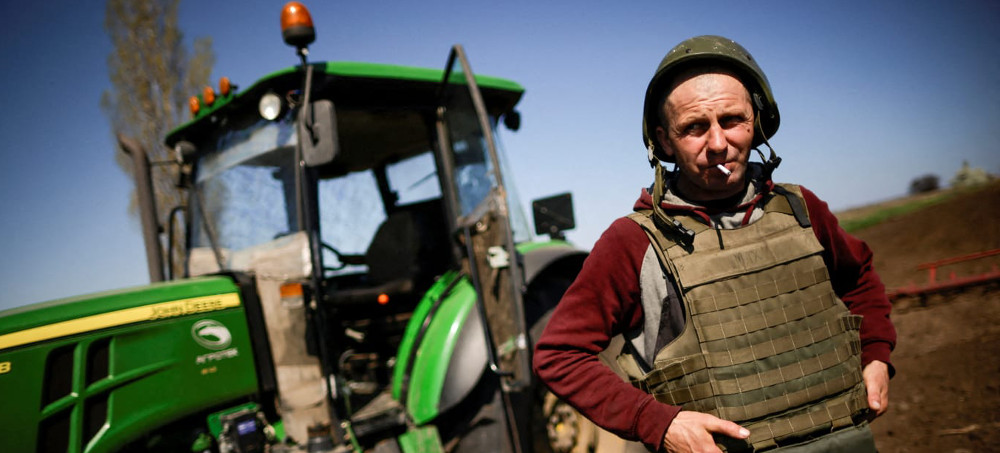 Ordinary citizens in cities like Mariupol and Melitopol have launched a "partisan resistance" to derail the Kremlin's takeover. (photo: Ueslei Marcelino)
Ordinary citizens in cities like Mariupol and Melitopol have launched a "partisan resistance" to derail the Kremlin's takeover. (photo: Ueslei Marcelino)
Ordinary citizens in cities like Mariupol and Melitopol have launched a “partisan resistance” to derail the Kremlin’s takeover.
The latest surprise for Russian troops came in Melitopol, where Mayor Ivan Fyodorov said local farmers had caused “mass illness” among Russians by poisoning cherries.
“Our farmers prepared another gift for the [Russians]—recently treated sweet cherries, which caused mass illness among those who stole them from the farmers. It’s the latest kind of partisan resistance on the territory of Melitopol,” Fyodorov told local reporters on Thursday.
He said pro-Ukrainian sentiment remains strong in the city, despite Russian authorities portraying themselves as saviors who “rescued” residents from Ukraine.
“Melitopol residents fully ignored the celebration of Russia Day. The whole country saw—last Sunday only 15 people out of 70,000 residents who stayed in the temporarily occupied city stood in line for [Russian] passports,” he said.
Even Russian troops in the Kherson region appear to be keenly aware of the Ukrainian resistance, according to audio released Thursday by Ukraine’s Security Service.
In a nearly two-minute recording of what Ukrainian intelligence describes as an intercepted call between Putin’s troops, a man identified as a soldier tells his friends the guys on the front line there are “going crazy.”
“Where they are located… no one is sure about the locals: who they are, what they’re doing. Maybe they are fucking with us at night, while they’re peaceful people during the day. No one can be trusted. An old woman walking around with pies might be a fucking colonel acting as an artillery spotter at night.”
Russian authorities have begun opening up passport processing centers in the occupied territories, and in Kherson, residents were informed this week that any babies born after Feb. 24 would automatically be given Russian passports, Russia’s RIA-Novosti news agency reported.
But Ukrainian residents are not letting them get off easy for the forced “Russification.” A new report by the Institute for the Study of War this week listed a series of recent guerrilla-style attacks by Ukrainian partisans in cities including Berdyansk and Mariupol.
“Russian authorities are continuing to face difficulties implementing their occupation agendas due to pro-Ukrainian pressure in occupied areas,” the report noted, describing teachers “refusing to teach under Russian curricula” in Berdyansk and “unidentified Ukrainian partisans” targeting staffers of Russia’s Emergency Ministry in Mariupol.
Petro Andriushchenko, an aide to the Mariupol mayor, described the latter incident in a post on Telegram on Wednesday.
He said two tractors and three large truck trailers parked outside the Russian Emergency Ministry’s headquarters “suddenly” went up in flames on July 9 due to an arson attack.
Two days later, he said, on the eve of the city’s “Day of Russia” celebrations, a staffer for the same ministry was stabbed in the back while standing in a crowd.
“The injury turned out to be fatal,” he said. “We’re talking to you, scum. Start looking behind you. Retribution is already near.”
 Atlanta wants to build a police training facility in the city's forested parkland in spite of wide community opposition. (photo: Getty)
Atlanta wants to build a police training facility in the city's forested parkland in spite of wide community opposition. (photo: Getty)
Atlanta wants to build a police training facility in the city’s forested parkland in spite of wide community opposition
On the ground below it, forest paths have been blocked with makeshift barricades of branches and used tires. There is a burned-out white pickup truck with “Defend the forest” spray-painted in black on its tailgate.
The city of Atlanta wants to build a $90m training center for police and firefighters in this suburban patch of forest. In response activists have taken to the trees to protest what they dismiss as a “Cop City”, a plan that was approved amid local opposition.
Clashes have sometimes turned violent. The city says protesters are trespassing on private land. Several protesters were arrested in a raid in mid-May after a confrontation in which molotov cocktails were thrown at officers patrolling the land.
The Atlanta Police Foundation, which is helping fund the project in an unincorporated part of DeKalb county, says on its website that it will have “the necessary facilities required to effectively train 21st-century law enforcement agencies responsible for public safety in a major urban city.”
Among the training features will be a burn tower for firefighters to practice extinguishing life-threatening blazes; areas for high-speed vehicle chases; a helicopter landing pad; a mock village including residential, school, nightlife and community areas, with structures such as a bank and a gas station; and a shooting range.
Neither the foundation, the police department nor the mayor’s office responded to requests for comment.
“They’re going to call us like eco terrorists, and all kinds of stuff like that,” said an activist who gave the name Red, and who led a reporter on a tour of the area recently. “A lot of people out here had friends who’ve died, been imprisoned, been shot, and experienced a lot of trauma, so they have a really internalized hatred of police. There are other people who are very aware of the fact that the police are human beings who are trying to do what they think is right.”
Deeper into the area is a clearing where several junked cars and propped-up door frames are arranged among thick kudzu, most of them spray-painted with anarchist graffiti and expletive-laced anti-police slogans. Most notable is a yellow school bus, which is riddled with bullet holes in its windows and side paneling. Locals and activists believe that police use it for target practice, though police have not confirmed this.
The group that Red represents, Defend the Atlanta Forest, as well as other Atlanta residents who oppose the training ground’s construction, are concerned about the environmental and social impacts of the project.
The area has been critical in preventing stormwater flooding. Efforts are being made by environmentalists, community organizations and other advocates to create a conservation area here called the South River Forest, which would be the city’s largest protected green space.
In addition to air quality concerns from fires and weapons training, there is a historical legacy of disinvestment in this mainly Black section of metro Atlanta, and a history of cruel treatment of those incarcerated at a prison agricultural facility located in the forest, which closed in 1995.
Some neighborhoods here are 75% Black or higher, according to the US census, and they have high rates of poverty and health challenges, such as diabetes and asthma.
The development has become more controversial since it was approved by the Atlanta city council in September 2021. Some Atlantans have complained that the development process has not been transparent enough, and that public opinion has been disregarded. Just before the September vote, the council received 17 hours of recorded public comment, with an overwhelming 70% of residents expressing their opposition. Still, it passed in a 10-4 vote.
The local chapter of the Sierra Club, which urged the Atlanta city ouncil to vote against the project, remains opposed.
“We’re certainly disappointed that the city continues to move forward with this project despite the overwhelming public opposition,” said Nina Dutton, chair of the club’s Metro Atlanta Group, in an email. “The environmental ramifications of clearcutting a wide swath of one of the last remaining undeveloped forests in our city and replacing it with this facility would be significant and long-lasting.
“If built, the APF’s facility would constitute a huge investment into a system of policing and militarization that has already proven to be dangerous in this city and around the world, in forms ranging from racial disparities in deadly interactions with police, to pollution from explosives and gun ranges persisting in the environment.”
Kendra Kelly, a retired army reserve and air force veteran, has lived in the area for six years. She says she hears gunfire and explosions almost daily, from morning to night, which she says are jarring, and she worries that development will disrupt the ecology of the area.
“It almost makes it seem like the needs of those in the community aren’t important or considered at all. It seems like it’s just a matter of convenience – the easiest, simplest accomplishment, more than consideration of the area, and how Black folks are impacted.”
Adding to concerns are plans for an Atlanta-based film studio, Blackhall Studios, which produced the television series Lovecraft Country, to expand into Intrenchment Creek park. It has acquired 40 acres as part of a controversial land swap with the county.
By the rusted gate barring the entrance of a prison farm building, Red lights a cigarette.
“We don’t want to live in a police state. We don’t want to live in a world that’s ravaged by climate change. And, you know, we just want to protect the nature that exists. And for me as an individual, this whole thing is coming from a place of love, not from rage or anger.”
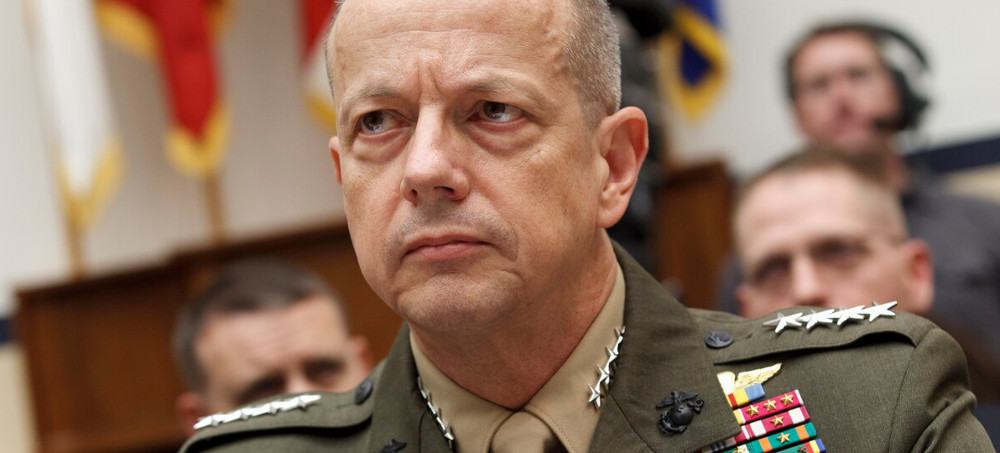 Retired four-star Marine Gen. John R. Allen, seen in 2012. A federal investigation is looking into whether Allen lobbied on Qatar's behalf without disclosing his activities, as required under federal law. (photo: J. Scott Applewhite/AP)
Retired four-star Marine Gen. John R. Allen, seen in 2012. A federal investigation is looking into whether Allen lobbied on Qatar's behalf without disclosing his activities, as required under federal law. (photo: J. Scott Applewhite/AP)
A trio of measures — addressing lobbying, gifts and online donations — is backed by a group with wide-ranging ideologies
The legislation would also compel tax-exempt groups, including think tanks, to disclose high-dollar donations and gifts from foreign powers and require political campaigns to verify that donors have a valid U.S. address, using the three-digit CVV code on the back of credit cards.
The proposed measures, which have not been previously reported, respond to growing concern on Capitol Hill that key components of the government and civil society remain susceptible to foreign interference, six years after the Kremlin mounted a campaign to influence the 2016 presidential election.
The legislation addresses issues brought to light more recently by the federal probe into whether retired four-star Marine Gen. John R. Allen, who resigned over the weekend as president of the Brookings Institution, lobbied on Qatar’s behalf without disclosing his activities as required under federal law. And the proposals come amid stepped-up enforcement by the Justice Department of the Foreign Agents Registration Act, including the decision last month to sue Steve Wynn, a developer and Republican megadonor, to compel him to register as an agent of China.
The bill has bipartisan backing. Its lead sponsor is Rep. Jared Golden, a Democrat and Marine veteran from a conservative-leaning district in Maine, who said one of the chief problems with the U.S. political system is that “corruption is either completely legal or punished with slaps on the wrist.” An aide to Golden said the congressman’s effort to find consensus for a targeted package of anti-corruption measures is in response to the GOP’s rejection of a broader voting rights, elections and ethics bill, known as H.R. 1.
Joining Golden in introducing the legislation were members as disparate as Reps. Katie Porter of California, a liberal consumer protection attorney and rising Democratic star, and Paul A. Gosar of Arizona, a Republican acolyte of former president Donald Trump who has spread conspiracy theories about everything from election security to the recent school shooting in Uvalde, Tex. Rep. Lance Gooden (R-Tex.) is also a sponsor.
In a statement endorsing Thursday’s legislation, Gosar emphasized a measure that seeks greater transparency in online campaign donations. “Full disclosure of online contributions will ensure that the American people know the sources of campaign money and will greatly assist with maintaining a system of free and fair elections,” he said.
Federal law already prohibits contributions from foreign nationals in any federal, state or local election. But the bill’s sponsors say there are loopholes, including the absence of a requirement that campaigns use industry-standard tools to verify the details of online contributions.
Porter stressed the bipartisan relevance of the legislation. “Americans distrust government no matter which party is in power,” she said.
The measures, while not citing Allen or any other person, are made acutely necessary by recent allegations, the bill’s sponsors say.
Allen, who served as the top U.S. commander in Afghanistan from 2011 to 2013, claimed that his initial contact with a political donor now serving a 12-year prison sentence related to the creation of a military advisement board for the government of Qatar, according to a search warrant filed in U.S. District Court for the Central District of California.
Court records show the inquiry is focused on whether Allen secretly urged the Trump administration to temper its criticism of Qatar in 2017, when the country faced sanctions in connection with accusations of supporting Islamist extremism.
A spokesman for Allen said the retired general “has done nothing improper or unlawful, has never acted as an agent of Qatar or any foreign government or principal, and has never obstructed justice.”
The bill’s sponsors also point to a 2020 study from the D.C.-based Center for International Policy that found that the nation’s premier think tanks received at least $174 million in funding from foreign powers between 2014 and 2018. Among those receiving the most foreign funding, according to the analysis, was Brookings.
A Brookings spokesman said the think tank “has strong independence policies to ensure no financial supporter influences the research findings or policy recommendations of its experts.” Following a review in 2019, Brookings started to subject foreign donors to enhanced scrutiny, including an assessment of the funder’s “democratic status and track record on support to independent civil society,” the spokesman said.
Most think tanks organized as nonprofits are under no obligation to disclose their donors, though some, such as Brookings, do so voluntarily. The legislation from Golden and others would require disclosure of gifts and donations from foreign powers greater than $50,000 in a given year.
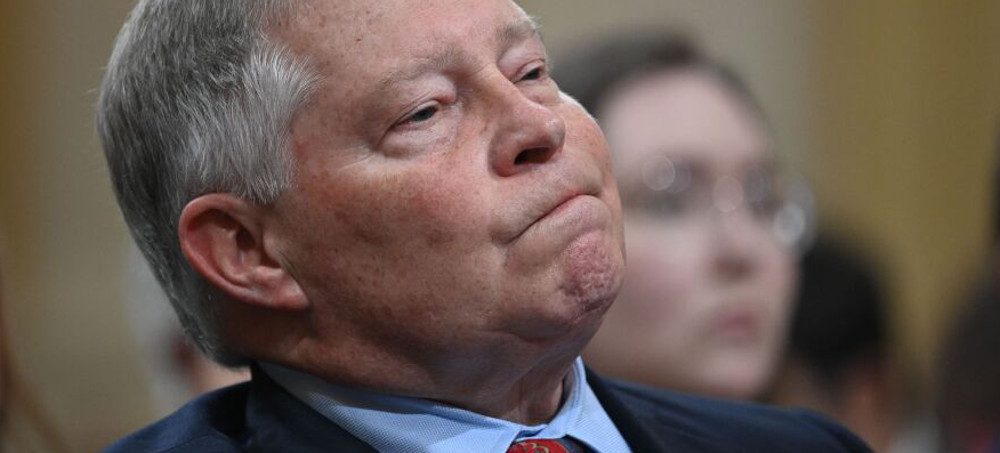 Retired judge and informal advisor to Vice President Mike Pence, J. Michael Luttig, arrives to testify during the third hearing of the U.S. House Select Committee to Investigate the January 6 attack on the U.S. Capitol, on Capitol Hill in Washington, D.C. (photo: Mandel Ngan/Getty)
Retired judge and informal advisor to Vice President Mike Pence, J. Michael Luttig, arrives to testify during the third hearing of the U.S. House Select Committee to Investigate the January 6 attack on the U.S. Capitol, on Capitol Hill in Washington, D.C. (photo: Mandel Ngan/Getty)
In her opening remarks, Vice Chair Rep. Liz Cheney, R-Wyo., said: "What the president wanted the vice president to do was not just wrong. It was illegal and unconstitutional.”
It's the third of seven hearings expected this month to present evidence from the committee's months-long investigation into the connection between Trump's voter fraud conspiracy claims and the insurrection on the Capitol on Jan. 6, 2021.
Before the hearing began, committee leaders said they want to invite Ginni Thomas, the wife of Supreme Court Justice Clarence Thomas, to speak to the panel. The Washington Post reported that the committee has evidence of Ginni Thomas communicating with lawyer John Eastman about overturning the 2020 presidential election. The committee says Eastman was central to a pressure campaign against Pence to reject the election results.
Monday's hearing focused on Trump's role in perpetuating the lie that the 2020 election was stolen from him and presented witness testimony and recorded interviews showing that many of the former president's advisers knew the election wasn't stolen and told him so, but he ignored them. Instead, he listened to those in his inner circle who urged him to declare victory on election night and embrace baseless claims of massive voter fraud.
- What to expect: In a short video previewing the hearing, Cheney said Trump "plotted with a lawyer named John Eastman and others to overturn the outcome of the election" though the former president had "no factual basis for what he was doing."
- Who will testify: Greg Jacob, attorney for Pence. In a memo sent to Pence a day before the Jan. 6 riot, Jacob wrote that blocking or delaying the certification of electoral votes would be a violation of federal law. Also appearing will be former federal judge Michael Luttig, who provided counsel to Pence in the days before the insurrection; Cheney said Luttig will explain how Eastman — a former law clerk for the conservative judge — "was wrong at every turn."
- Where the proceedings are headed: Committee members appear to be split on whether to leave open the possibility of making a criminal referral against Trump to the DOJ. Even without a criminal referral, the department could indict Trump or anyone else if the facts line up to make a compelling case — and Attorney General Merrick Garland, who says he's watching the hearings, has said repeatedly his department will "follow the facts wherever they lead."
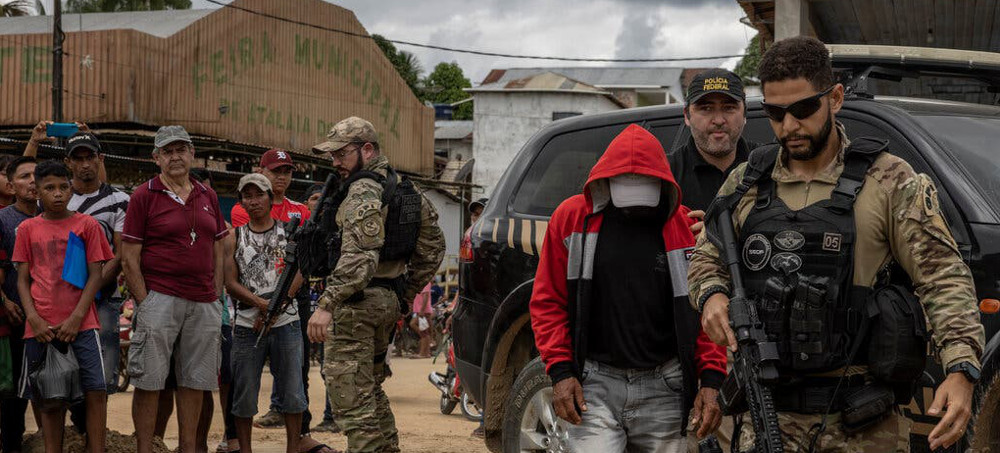 Police officers on Thursday escorted Amarildo da Costa de Oliveira, one of the two brothers accused of killing Bruno Pereira and Dom Phillps. (photo: Victor Moriyama/The New York Times)
Police officers on Thursday escorted Amarildo da Costa de Oliveira, one of the two brothers accused of killing Bruno Pereira and Dom Phillps. (photo: Victor Moriyama/The New York Times)
ALSO SEE: Fisherman Confesses to Killing Men Missing
in the Brazilian Amazon
A key police outpost lies in ruins after a daring raid – a sign of the growing danger on an increasingly lucrative smuggling route
Were Brazilian drug traffickers responsible for burning the Peruvian police outpost on the River Yavarí to the ground?
Was it Colombian guerrillas who stormed the camp, shooting at the border guards and making off with their high-powered weapons?
Or were the culprits rogue Peruvian police officers, perhaps working for organized crime?
The answer depends on who you talk to – but the consequences were the same.
Five months after the audacious raid, the camp lies in ruins. Charred logs are the only remnant of a turquoise lodging the Peruvian troops had called home.
Filing cabinets and metal bunk beds are scattered in the undergrowth while the ground is littered with empty cans of tuna fish and spam. Tiger orange butterflies dance around an abandoned border marker, bringing colour to an otherwise desolate scene.
“They took guns, rifles, bullets, the lot,” said one local, who gave the Guardian a tour of the strategically positioned base, located opposite the entrance to the River Itaquaí, where Phillips and Pereira are feared to have been murdered.
The local said the security situation had been deteriorating since 2020 as Latin American drug cartels and factions fought for control of this increasingly lucrative smuggling route.
“This is what the region is like now,” they sighed as they surveyed the deserted police position past which boats packed with drugs can now travel undisturbed. “It didn’t use to be like this.”
But this is not the first such attack on the feeble law enforcement in the Amazon region where Peru meets Colombia and Brazil.
“The narcos are bolder, more aggressive; they have attacked three police posts in the last five years,” a Peruvian anti-narcotics officer said.
“The small [police] bases are too remote, too isolated, too exposed. You need bases with 200 to 300 men, not 10 or 20,” he said. He estimated that 120 tonnes of cocaine base paste were being smuggled across the porous frontier between Peru and Brazil every year.
“This is an area being controlled by organised crime, not by the Peruvian state,” he said. Despite occasional police and military raids, the crime wave has overwhelmed state authorities in all three countries.
“The Amazon is a cancer patient and we’re just giving it a pill for the pain,” he added grimly.
The surge of criminal activity is partly driven by the rapid expansion of plantations of coca – the raw material of cocaine – on the Peruvian side of the triple frontier. Cultivation of the plant in the area known as Bajo Amazonas nearly doubled between 2019 and 2020 from 2,531 to 4,247 hectares, according to the Peruvian Drugs Observatory.
Across Peru, coca cultiviation grew by 41% between 2016 and 2020, according to official Peruvian figures – an increase from 439 sq km to 617 sq km. The White House Office of National Drug Control Policy (ONDCP) says coca field cultivation is higher, reaching 882 sq km (or 88,200 hectares) in 2020, equivalent to 810 tonnes of potential cocaine.
Peru is the world’s second-biggest producer of cocaine after Colombia, according to the UN, producing around 26% of global cocaine output. The last two years have been bumper harvests.
But the country has also been buffeted by other forces: Peru suffered the world’s worst recorded per capita death toll in the Covid pandemic and its devastating impact hit law enforcement and drove rocketing unemployment. The result is a bonanza for organised crime in the Amazon region which stretches across more than half the country.
For Indigenous communities, that has led to a rise in intimidation, violence and murder as drug gangs target their land to plant new coca crops. Covid restrictions made the remote region even more vulnerable by slowing state efforts to protect land and eradicate illegal coca cultivation.
“We are facing a well-structured organisation that protects drug trafficking and other illegal activities in the Amazon,” said Robert Guimaraes, 49, a longtime Indigenous leader in Ucayali, in Peru’s central Amazon.
“Unfortunately, the state does not have the capacity to intervene sufficiently, and above all to support the Indigenous peoples of Ucayali who are on the border [with Brazil],” he said in Flor de Ucayali, the Shipibo-Konibo Indigenous community where he was born.
“There are no police here to give security to the people,” he said, joining a clamour of Indigenous Amazonian leaders who say police and prosecutors are failing to follow up their warnings, and are allowing killers to operate with impunity.
Ricardo Soberón, executive director of Peru’s anti-drug agency Devida, told the Guardian that “international drug trafficking has been directed totally towards the Amazon” as a result of the pandemic.
It is no coincidence that in 2020, Peru’s environment ministry reported record Amazon deforestation. A staggering 2,032 sq km(785 sq miles), a figure almost four times the 548 sq km it lost in 2019.
Across the triple frontier border, Brazil’s Amazonas state has become the battleground for a bitter struggle between rival drug militias, the São Paulo-based First Capital Command and Rio de Janeiro-based Red Command. In the past two years the balance has tipped in favour of the Red Command, according to security experts.
Gen Mauro Esposito, former coordinator of special border operations for Brazil’s federal police, said both Brazilian gangs now have cells operating in the cocaine-producing regions of Peru along the length of the two countries’ Amazon border, where small planes carrying drugs cargoes make daily flights.
Barbara Arisi, a Brazilian anthropologist of Vrije Universiteit in Amsterdam and specialist in the Indigenous peoples of the Javari Valley (as the Yavarí is known in Brazil), said illegal fishing and hunting were the principal criminal activities in the area where Phillips and Pereira disappeared.
But she worried that drug traffickers using the rivers, or even transporting shipments on foot through the remote region, could put isolated communities at risk, particularly from illnesses to which they have no immunity.
“They could cause whole populations to die and we wouldn’t know anything about it,” she said. First contact with the Matis people in the 1970s decimated two-thirds of their population, she noted.
“The Indigenous [in the Javari Valley] people have a tragic past,” she told the Guardian.
“Now they are fighting because their friends have been killed. They are showing their faces, they are brave enough to protest in the face of organised crime,” she added.
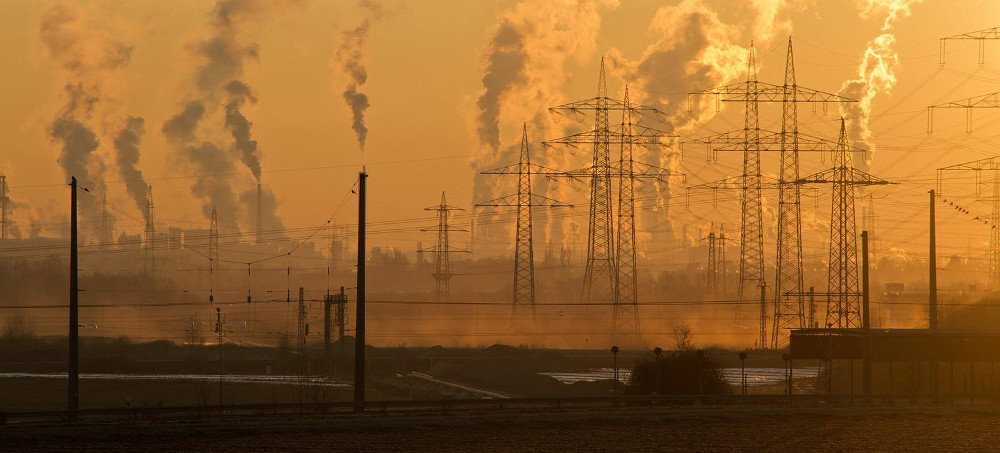 Air pollution, which is primarily the result of burning fossil fuels, takes 2.2 years of the global life expectancy for each person, according to new research. (photo: Getty)
Air pollution, which is primarily the result of burning fossil fuels, takes 2.2 years of the global life expectancy for each person, according to new research. (photo: Getty)
The Air Quality Life Index, or AQLI, finds that taken together, air pollution takes a collective 17 billion years of life, and reducing air pollution to meet international health guidelines would increase the global average life expectancy from roughly 72 to 74.2 years
Firsthand cigarette smoke reduces life expectancy by 1.9 years, on average, according to the report. Alcohol and drug use reduce life expectancy by nine months on average, unsafe water and sanitation reduce expectancy by seven months, HIV and AIDS reduce life expectancy by four months, malaria reduces average life by three months, and conflict and terrorism reduce life expectancy by seven days, the report said.
The AQLI report is notable because its estimate of the impact on particulate pollution on human life expectancy is based on research that allows it to show causation, not just correlation. “Because of the way these studies were designed - and the quite fortuitous set of policies that enabled that design, they established a causal, rather than a correlative, relationship between particulate matter exposure and mortality,” Christa Hasenkopf, the director of AQLI, told CNBC.
Air pollution is so dangerous because it is impossible to avoid, especially for people who live in particularly polluted locations, the report says. “Whereas it is possible to quit smoking or take precautions against diseases, everyone must breathe air. Thus, air pollution affects many more people than any of these other conditions,” the report says.
Sixty percent of particulate matter air pollution is caused by fossil fuel combustion, 18% comes from natural sources (including dust, sea salt, and wildfires), and 22% comes from other human activities.
The report, developed by the University of Chicago’s Michael Greenstone and his team at the EPIC, is a measurement of the air pollution in 2020, when the Covid-19 pandemic was reducing activity and transportation.
The massive contraction of activity reduced global pollution levels only by a tiny bit. Population weighted-average particulate matter declined from 27.7 micrograms (one-millionth of a gram) per cubic meter of air to 27.5 micrograms per cubic meter of air between 2019 and 2020, according to the report.
And in South Asia, where air pollution is the most dire, the air pollution rose in 2020 from the year prior. India, Pakistan, Bangladesh and Nepal are among the most polluted countries in the world.
Particulate matter air pollution is suspended in the air and categorized by its size. The smaller it is, the deeper it can get into the body. Particulate matter with a diameter of less than 10 micrometers, often designated PM10, can pass through the hairs in the nose, down the respiratory tract and into the lungs.
Smaller particulate matter with a diameter less than 2.5 micrometers, often designated as PM2.5, is about 3% the diameter of a human hair and can get into the bloodstream by way of the lungs’ alveoli. It can affect blood flow, eventually causing a stroke, heart attack and other health issues.
When the World Health Organization first published air quality guidance in 2005, it said the acceptable levels of air pollution was less than 10 micrograms per cubic meter. In September, the World Health Organization changed its benchmark guidelines to below 5 micrograms per cubic meter.
Currently, 97.3% of the global population, equaling 7.4 billion people, live in places where the air quality does not pass the recommended 5 micrograms per cubic meter limit recommended by the WHO for particulate matter with a diameter of less than 2.5 micrometers.
“This report reaffirms that particulate pollution is the greatest global health threat,” wrote Greenstone, who was previously the chief economist for former President Barack Obama’s Council of Economic Advisers. “Yet we also see the opportunity for progress. Air pollution is a winnable challenge. It just requires effective policies.”
For example, China has been able to dramatically improve its air quality. In 2014, after a year in which China had record levels of pollution, the then premier, Li Keqiang, declared a “war against pollution.” The government spent money to combat pollution and was able to reduce particulate pollution by 39.6%, the report says.
Despite China’s progress, the air pollution levels in China are still more than what the WHO recommends.
“It is important to note that air pollution is also deeply intertwined with climate change. Both challenges are primarily caused by the same culprit: fossil fuel emissions from power plants, vehicles, and other industrial sources,” the report’s executive summary says. “These challenges also present a rare win-win opportunity, because policy can simultaneously reduce dependence on fossil fuels that will allow people to live longer and healthier lives and reduce the costs of climate change.”
The American Medical Association, the country’s largest physician trade group, voted on Monday to adopt a policy to declare climate change a public health crisis.
“The scientific evidence is clear — our patients are already facing adverse health effects associated with climate change, from heat-related injuries, vector-borne diseases and air pollution from wildfires, to worsening seasonal allergies and storm-related illness and injuries. Like the COVID-19 pandemic, the climate crisis will disproportionately impact the health of historically marginalized communities,” said AMA Board Member Ilse R. Levin, in a written statement announcing the vote. “Taking action now won’t reverse all of the harm done, but it will help prevent further damage to our planet and our patients’ health and well-being.
Special Coverage: Ukraine, A Historic Resistance
READ MORE
Follow us on facebook and twitter!
PO Box 2043 / Citrus Heights, CA 95611

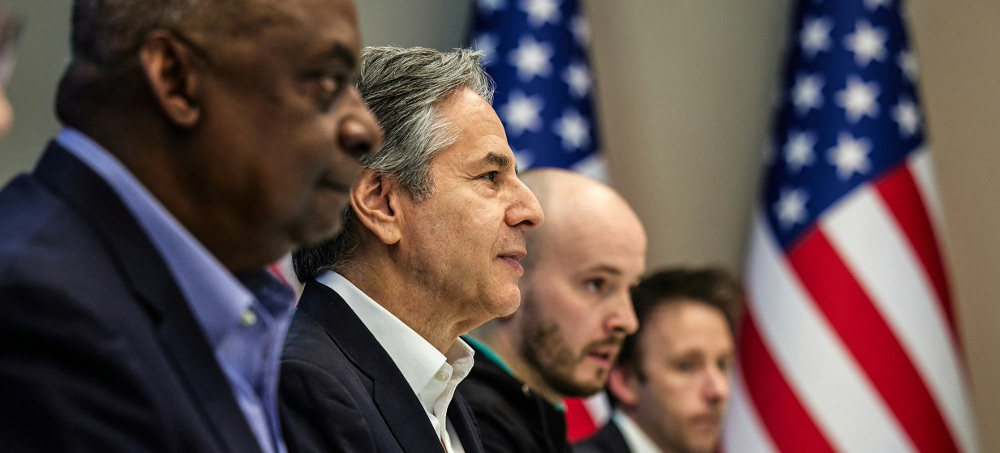

No comments:
Post a Comment
Note: Only a member of this blog may post a comment.